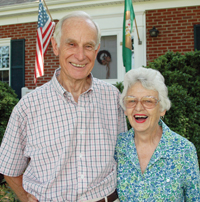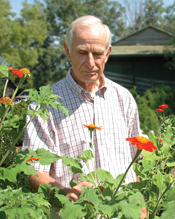|
Worth Cultivating
by Paula Steers Brown, Contributing Writer
|

Hudson met his wife, Shirla -- who
at the time was a county extension agent - when she began teaching a
4-H class after school in his Vo-Ag classroom. The couple has been
growing together for nearly 50 years.
|
Worth Hudson has always been
successful at growing things.
A master gardener known for
propagating heirloom boxwoods on his farm near Virgilina in Halifax County,
Hudson is likewise a natural at cultivating scholarship, having spent 34
years as a teacher, principal, and director of exceptional children.
Hudson served on Mecklenburg Electric Cooperatives board
of directors for 31 years, 18 as its chairman, until his retirement in 2007.
He was instrumental in founding the Virginia, Maryland and Delaware electric
cooperatives Educational Scholarship Foundation in 2000, has grown the
program perennially, and continues to serve on it's selection committee. In
2009 the foundation awarded $43,500 to deserving scholars from areas served
by all 16 electric co-ops in the three-state area. The $1,000 scholarships
bear Hudson's name, appropriate not only because of his role in starting the
program, but also because he is, himself, a perpetual student of the world.
Hudson retains a youthful wonder, a Jeffersonian
curiosity about all the arts and sciences, and a reverence for the
environment. John Lee, president and CEO of Mecklenburg Electric
Cooperative, characterizes Hudson as "the epitome of a Southern Gentleman"
who has committed a lifetime to community service. Lee notes that,
"Together, he and his life partner, Mrs. Hudson, have worked diligently to
advance education at every opportunity." The soft-spoken Hudson's exemplary
leadership, grounded in appreciation for his rural roots, has grown into
world-wise connections, good lessons for all.
Hudson reminisces about growing up on the family farm,
McLane, which has been in Hudson's family since his great grandfather, where
the family raised tobacco, cattle and poultry. He remembers this area of
Southside Virginia getting electricity in 1947, when Mecklenburg Electric
Cooperative brought it in. He also remembers having a kerosene-fueled
refrigerator and 12 years without electricity.

Whether he's cultivating
heirloom boxwoods, seasonal flowers, food for the table, or food for
thought, Worth Hudson has a knack for growing things. |
His mother handled the farm's chicken business, which
took a giant leap forward when Mecklenburg Electric engineer Elwood
Blackwell and Worth figured out a design for an electric chicken brooder, a
vast improvement over the wood-burning furnace they had been using for the
baby chicks. Worth won a district 4-H award for this project. Next, he was
off to the National 4-H Congress in Chicago when he won state honors in
another area vegetable gardening. Worth still uses that expertise,
producing an array of vegetables and berries to be canned and preserved for
groaning pantry shelves.
Worth went to Virginia Tech, or "VPI, as it was called
then," and went on to teach Vocational Agriculture. A 4-H class met after
school in Worth's Vo-Ag room, taught by an extension agent named Shirla
Griffin. Although she quips that Worth "looked married," he wasn't, until
she became Mrs. Hudson in 1961.
Shirla, who has a master's degree from the University of
Virginia, taught elementary school for 25 years. She started teaching the
same day their youngest son, Tansel, began school. Worth got his master's
degree at the University of Virginia. While there, he says he
"helped them
prune" the Rotunda boxwood and started to grow cuttings from Thomas Jefferson's boxwoods. He also got a start of Governor James Barbour's
boxwood from Barboursville. Now, all of these patrician green descendants
are planted around the Hudson property. Worth grows lush-leaved boxwoods in
long, neat lines near the shady fencerows after they leave his rooting bed.
He uses the fallen leaves from the yard for his boxwoods mulch.
Worth loves Colonial Williamsburg
and had always wanted an 18th-century garden. Head hostess, Elizabeth Callis,
referred him to Donald Parker in charge of landscape. Worth sketched out his
idea, which Parker "kind of gave his stamp of approval to," says Worth,
"since he could not officially sanction a design." Flower Grower magazine
sponsored a contest in 1970 called Dream Garden, and Worth won the prize of
$100 for plant material with his formal 18th-century garden.
With his winnings, he bought eight anchoring
fruit trees. The original formal quadrants had roses inside, but
"it got
shadier over the years and there has been some disease," so
"it has loosened
up."
He has experimented with informal plantings and his goal
is to have "something of interest all year a succession of bloom:
forsythia, jonquils, peonies, iris, double daylilies." Worth references
Thomas Jefferson's words to Charles Willson Peale in 1811 regarding the
ideal situation for flowers: "some one always coming to perfection." This is
what Worth likes "no big splash, but something coming along each season."
The Hudson farm is still dotted with log buildings that
Worth preserves with care. He is a preservationist always seeking new ways
to use and recycle materials. He was earth friendly before it was trendy.
The farm's old poultry house is now Worth's woodworking shop. The horse
stable, built by his father out of logs when Worth was a boy, has a trough
for horses and mules. He has an idea for a future Christmas project. What
could be more perfect as a backdrop for a nativity scene than this stable?
Other log outbuildings include a corn crib and an
ordering house for tobacco. Whenever any of the old pines and oaks on the
property are damaged, Worth brings in a mobile sawmill to cut the lumber
into planks because he cant stand to see any wood go to waste, and he has
even built a shed to cover the wood. He salvaged bricks from the old kitchen
chimney and has used them in his garden walks. There is a footbridge to a
spring. Worth explains that in his younger days they had to carry buckets of
water from there to the house and "you learned not to waste water!"
Worth became involved in the
International
Farm Youth Exchange program by virtue of his being a state 4-H winner. In
1954 his family hosted an exchange student from Finland, Seppo Kanervisto,
who brought his customary heavy clothes to Virginia, even though it was
August. He kept saying, "Virginia is a sauna."
According to Worth, Finns should know, as
"Finland then had more saunas than automobiles."
 |
Seppo, with whom the Hudsons are still in touch,
fashioned signs for the outbuilding dubbed "Little Finland" in Virginia when
Worth decided to turn one of the old chicken houses on the property into a
sauna. The stove and the rock came from Finland, as did the thermometer and
the dipper, creating an authentic atmosphere, enjoyable in winter.
Worth fulfilled a lifetime dream
in 2000 when he and Shirla traveled, along with his friend Seppo and Seppo's
wife, Aila, through battle sites in France and into Belgium, retracing the
route his father had taken during World War I.
Worth's father had kept a diary. The entries
from Nov. 10 and 11, 1918, read:
Nov. 10, 1918
Hanging around all day waiting to get up and at 'em."
Nov. 11 At 2:15 a.m. were awakened to get ready to go over. Waited
for about an hour when we were told it was all over. We celebrated the event
by going to bed that night in Church Syngem (in
Belgium).
The diary ends there with the wars end. Worth and Seppo
and their wives stopped at a fruit stand in Belgium to ask about the area.
The man selling fruit understood and led them to Church Syngem, the very
sanctuary mentioned in the diary where his father had gone to give thanks.
Richard Johnstone, executive editor of Cooperative
Living, sums up Hudson's full life, interests, and talents:
"Worth is the
consummate Renaissance man, at ease with legislators and linemen." It is not
surprising that he was the 2004 Unsung Virginian award recipient.
Bob Jones, a member of Mecklenburg Electric Cooperative's
board of directors, admires his mentor Worth, who "leads by example with
great humility. It is his specialty, his strength. Worth's giving-back
philosophy rubs off on all those he encounters."
The careers and lifestyles of the Hudson's four sons
reflect the family's orientation toward service and environmental respect.
Tyler, the oldest, "who always liked building things and participated in
Jimmy Carter's work camps," now works for Habitat for Humanity in Orange
County, N.C. Craven, who was a forestry major at Virginia Tech, is an
extension director in Moore County, N.C. Brandon is a lawyer in Halifax and
now serves on the Mecklenburg Electric Cooperative board, and Tansel is at
the Maryland state office of the USDA's Natural Resource Conservation
Service.
Worth and Shirla have seven
grandchildren who romp on the family farm in Halifax County, where they
learn about nature and, at Christmastime, have developed the artful custom
of fashioning their grandparents evergreens into wreaths.
Worth creates handmade greeting cards for
friends using block printing and incorporating photos of his garden he has
taken throughout the year.
He's a man who creates, nurtures and grows things. The
care, special detail, and personal touch Worth Hudson puts into his every
effort could well serve as life examples for the many young people who
benefit from the scholarship program he helped create.
Indeed, Hudson's life is a worthy example for all.
|
|